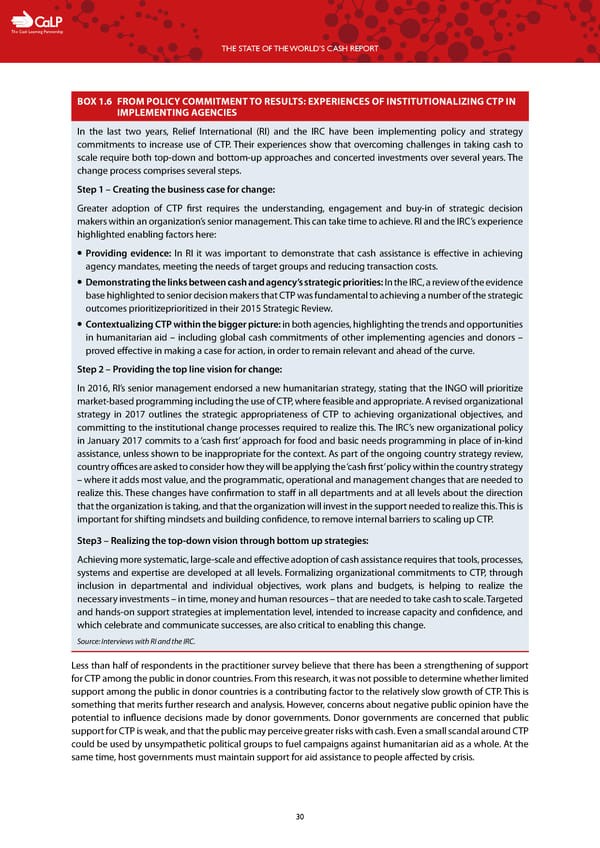C The Cash Learning Partnership THE STATE OF THE WORLD’S CASH REPORT BOX 1.6 FROM POLICY COMMITMENT TO RESULTS: EXPERIENCES OF INSTITUTIONALIZING CTP IN IMPLEMENTING AGENCIES In the last two years, Relief International (RI) and the IRC have been implementing policy and strategy commitments to increase use of CTP. Their experiences show that overcoming challenges in taking cash to scale require both top-down and bottom-up approaches and concerted investments over several years. The change process comprises several steps. Step 1 – Creating the business case for change: Greater adoption of CTP first requires the understanding, engagement and buy-in of strategic decision makers within an organization’s senior management. This can take time to achieve. RI and the IRC’s experience highlighted enabling factors here: — Providing evidence: In RI it was important to demonstrate that cash assistance is effective in achieving agency mandates, meeting the needs of target groups and reducing transaction costs. — Demonstrating the links between cash and agency’s strategic priorities: In the IRC, a review of the evidence base highlighted to senior decision makers that CTP was fundamental to achieving a number of the strategic outcomes prioritizeprioritized in their 2015 Strategic Review. — Contextualizing CTP within the bigger picture: in both agencies, highlighting the trends and opportunities in humanitarian aid – including global cash commitments of other implementing agencies and donors – proved effective in making a case for action, in order to remain relevant and ahead of the curve. Step 2 – Providing the top line vision for change: In 2016, RI’s senior management endorsed a new humanitarian strategy, stating that the INGO will prioritize market-based programming including the use of CTP, where feasible and appropriate. A revised organizational strategy in 2017 outlines the strategic appropriateness of CTP to achieving organizational objectives, and committing to the institutional change processes required to realize this. The IRC’s new organizational policy in January 2017 commits to a ‘cash first’ approach for food and basic needs programming in place of in-kind assistance, unless shown to be inappropriate for the context. As part of the ongoing country strategy review, country offices are asked to consider how they will be applying the ‘cash first’ policy within the country strategy – where it adds most value, and the programmatic, operational and management changes that are needed to realize this. These changes have confirmation to staff in all departments and at all levels about the direction that the organization is taking, and that the organization will invest in the support needed to realize this. This is important for shifting mindsets and building confidence, to remove internal barriers to scaling up CTP. Step3 – Realizing the top-down vision through bottom up strategies: Achieving more systematic, large-scale and effective adoption of cash assistance requires that tools, processes, systems and expertise are developed at all levels. Formalizing organizational commitments to CTP, through inclusion in departmental and individual objectives, work plans and budgets, is helping to realize the necessary investments – in time, money and human resources – that are needed to take cash to scale. Targeted and hands-on support strategies at implementation level, intended to increase capacity and confidence, and which celebrate and communicate successes, are also critical to enabling this change. Source: Interviews with RI and the IRC. Less than half of respondents in the practitioner survey believe that there has been a strengthening of support for CTP among the public in donor countries. From this research, it was not possible to determine whether limited support among the public in donor countries is a contributing factor to the relatively slow growth of CTP. This is something that merits further research and analysis. However, concerns about negative public opinion have the potential to influence decisions made by donor governments. Donor governments are concerned that public support for CTP is weak, and that the public may perceive greater risks with cash. Even a small scandal around CTP could be used by unsympathetic political groups to fuel campaigns against humanitarian aid as a whole. At the same time, host governments must maintain support for aid assistance to people affected by crisis. 30
 The State of the World's Cash | Full Report Page 31 Page 33
The State of the World's Cash | Full Report Page 31 Page 33